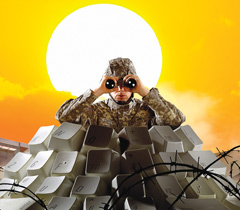UMBC and Its Cyberdawgs Tackle a New Challenge
Podcast Powered By Podbean
Click here if podcast doesn’t play
There’s no question that cybersecurity is a booming field. In Maryland, the state and federal government have made significant investments, and the number of companies working in the field is growing rapidly. For example, the bwtech@UMBC Research and Technology Park, which housed six cybersecurity companies in March, has added seventeen companies since then.
For Max Spector, a senior at UMBC, competing with the university’s Cyberdawgs is a savvy move to prepare for those career opportunities. But computer security is also in his blood. “I live and breathe it,” he said. “I walk into a bank and I see where the cameras are. In a supermarket, I see which version of Windows they’re running and I know where there is a vulnerability. It’s just how I think.”
UMBC hopes to encourage more Spectors. Along with several partners, the university is sponsoring the first-ever Maryland Cyber Challenge & Conference (MDC3) to get a new generation excited about defending our nation’s cyber systems.
To grow the field, companies and government agencies need “a skilled and clearable workforce,” said Ellen Hemmerly, executive director and president of the bwtech@UMBC Research and Technology Park. “UMBC plays a role in that it produces the most computer science graduates in the area.”
And, with the cyber challenge and conference, UMBC is enhancing not only its own role – but building Maryland’s overall strength in cybersecurity, she said. The event, known as MDC3, is slated for October 21 and 22 and will feature competitions for both students and professionals. The event was founded by UMBC, SAIC, the Tech Council of Maryland, the National Cyber Security Alliance (NCSA) and the Maryland Department of Business & Economic Development.
“The competition is unique,” said Richard Forno, Director of UMBC’s Graduate Cybersecurity Program. “We’re the official cyber-challenge event for Maryland, and I believe one of the few, perhaps only, such challenges in the country to offer meaningful scholarship prizes for the winners.”
Winning teams in both the high school and college divisions will receive scholarships sponsored by the National Security Agency. First place team members in each division will receive $5,000 scholarships, and second place team members will receive a $2,000 scholarship.
Spector and the Cyberdawgs will be competing in the challenge on October 22, along with seven other teams. All have already made it through two qualifying rounds.
In the first round, Spector said, teams were given 6 hours to complete the challenge. The way it works he said is “they give us two machines that are vulnerable to attack and we have to secure them.” The second round, he said, “is a more of a forensics challenge where we will be given machines infected with malware. And we need to remove that malware.”
Malware are viruses, spyware, or anything you don’t want on your computer, said Spector. “Some are easy to remove and some are really difficult to remove. It’s a big problem. Anti-virus software only works on malware that has been seen before. So there’s a need for people to identify malware that has never been seen before.”
Fahad Alduraibi, another member of the Cyberdawgs and a Ph.D. student in computer engineering, initially planned to be a doctor. But then he realized that if you wanted to do an experiment, “you need a big lab and fancy equipment. For computers you have your own lab in your computer.”
Changing his career goals from medicine to computer engineering harked back to an earlier interest for Alduraibi: “When I was young, in elementary school, I started working with the old Atari computers,” he said.
Marc Warfield, a junior and the president of the UMBC cyberdefense club, said that when he was “super excited” when he found out in his freshman year that UMBC had a cyberdefense team. He met the club president and another member of the team, “and they started explaining the basics to me right away,” he said. “It’s interesting because they don’t teach cybersecurity in school,” he said. “You have to learn really fast or sink.”
The team’s enthusiasm is infectious. The Cyberdawgs function mainly on their own, although they do have a faculty advisor, Charles Nicholas, also a professor of information technology and engineering. “Those guys know the technical stuff better than I do,” Nicholas said. “Most of these guys are very self-motivated.”
During practice and in competition the Cyberdawgs team splits into halves. Half of the team works on Windows and the other half works on Linux just as they will in the competition. Then two or three days before a competition, the event organizers will announce what the team will likely face.
“Then, we will start trying to mimic the scenarios they’ve told us we can expect,” ” said Alduraibi.
What will it take to win? “We need to be organized, and we need a team leader that will help in organizing the tasks,” said Alduraibi. “Someone with a to-do list.”
(10/07/11)

